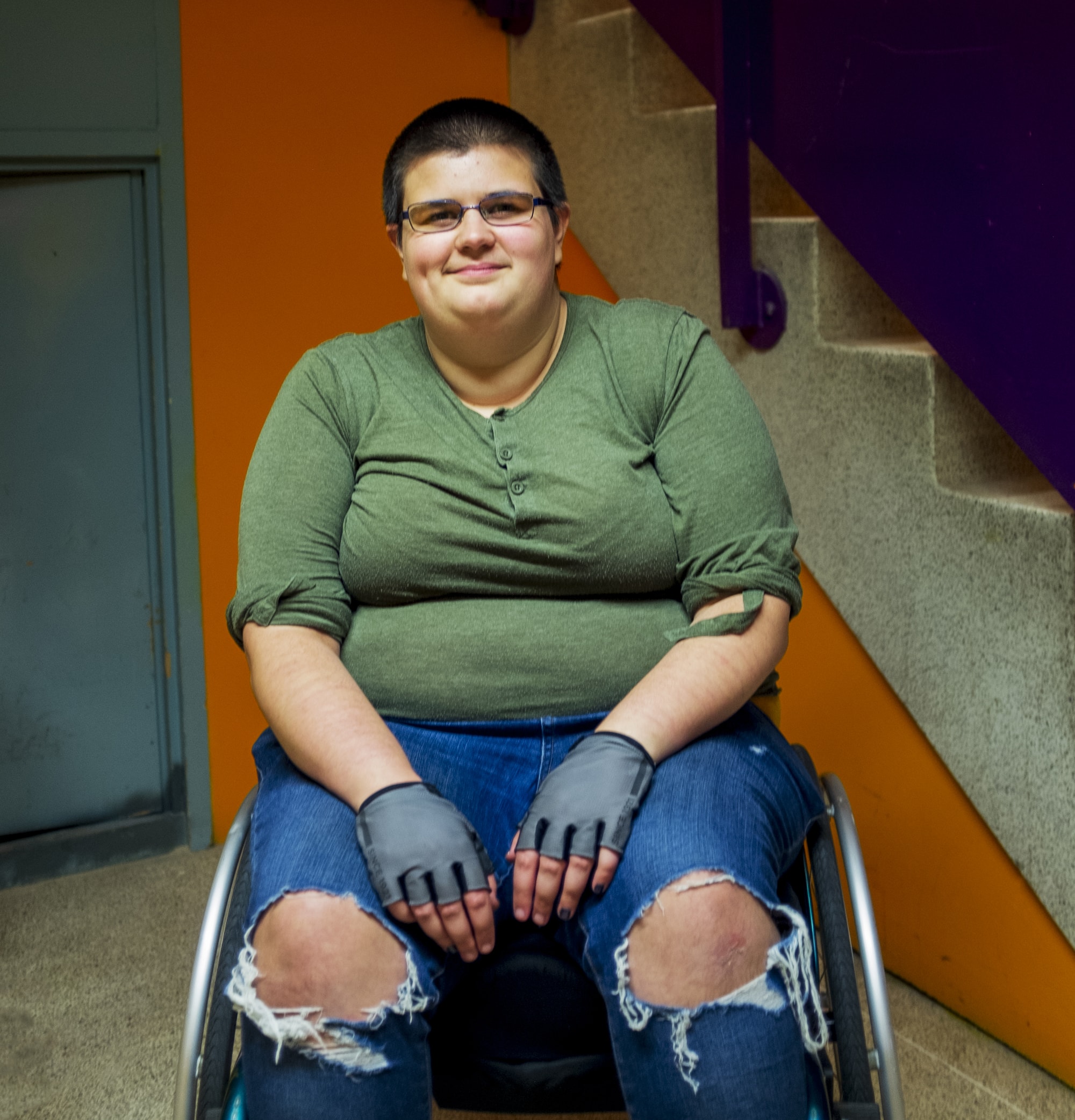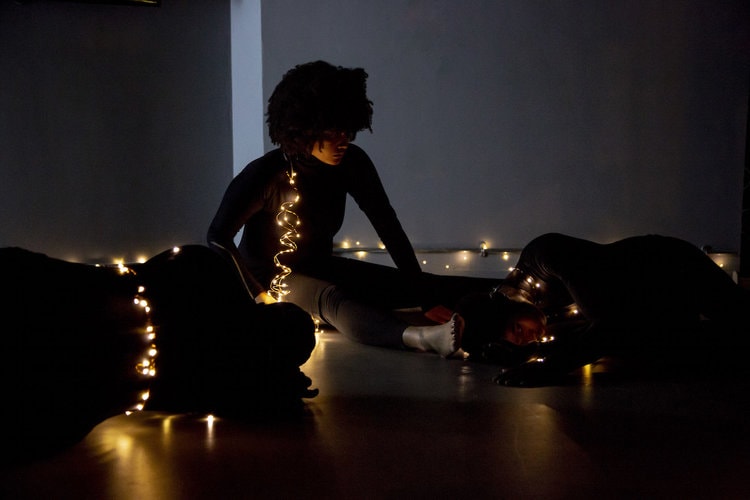Radical Body launches new platform to support chronically ill and disabled performing artists
Today we’re delighted to be supporting our Springboard company Radical Body with the launch of a new online platform designed to help chronically ill, disabled and/or housebound artists to connect, collaborate and share opportunities. The Radical Body Network is now live on Facebook, so if you feel you would benefit from being part of the community, you can sign up and introduce yourself.
Ahead of the launch, Radical Body founder Katie Walters told more about her experiences as a disabled performance poet, and what she hopes the network will achieve.
When people ask me what I do for a living, I tell them I’m a professional poet. Technically that’s true – I write poems, and people pay me to do it. But saying it doesn’t feel very honest, because I’m only a part-time poet, and I have another, full-time job. I rarely discuss this, because most people don’t understand how it’s a full-time job to be a cripple.
I don’t like describing my disability as a job, because it feels like ceding something to capitalism, which is inherently hostile to disabled people. But calling it work helps non-disabled people to understand its value. Put simply, I spend a lot of my time doing or thinking things that other people just don’t have to do – a concept that disabled people often refer to as “crip time”.
Theoretically, time is objective, but in practice we’re all aware that how we understand time depends on what we’re doing with it. An hour is a long time to brush your teeth, but a short time to write an essay.
Everyone has 24 hours in the day, and in that time, we’re expected to travel to and from work, work for seven hours, make and eat three meals, take a shower, maybe do some laundry, exercise, socialise and do it all again tomorrow. If we measure time by how long it takes to do things, it would take me about a week to get done what a non-disabled person can achieve in 24 hours.
I’m good at writing and performing poetry, but I struggle with the other things you have to do to be a professional poet. As an emerging artist, I found it incredibly difficult to access resources designed to support people starting out in their career. There are also a lot of things you’re expected to do, like getting out and consuming as much art as possible, going to open mic nights, meeting people and having the confidence to sell yourself to them.
Throughout my career, I’ve struggled with those things because I’m autistic. I don’t come over well in conversations. I don’t think I can make people understand what I’m about until they see my work. And then about three years ago, I developed a debilitating chronic illness, and things I had already been finding difficult became straight-up impossible. I lost the ability to do even basic things like cooking and cleaning. I couldn’t even think about going out.

Katie Walters - Radical Body,
A lot of access provision is focused around making physical adaptations to spaces – putting in ramps or captioning performances. But a ramp is useless to you if you can’t leave the house. How are you supposed to get your foot in the door if you can’t get to the door in the first place?
When non-disabled people ask me what I’ve been doing lately, my response is often met with blank faces, because so much of it is doing nothing. I need time to recover from the things that I am able to get out and do.
I am not particularly interested in talking to people who think that doing nothing is the same as being nothing, however. What’s more frustrating is the feeling that many of the non-disabled people I work with really want to accommodate my disabilities, but at the end of the day, unless they can slow to my time, I’m always going to be left behind. If you see someone at a lot of events you’re attending, it’s natural that you understand them to be part of your community and you start working with them. It’s easy to forget about people you don’t see.
Crip time is different for every disabled person, but we all have some understanding of its isolating effects. I started Radical Body with the aim of connecting artists and audiences who have experienced this in some way. We want to build a community that helps disabled artists to overcome these challenges, and we want to produce their work.
Our main project so far has been a stage show called Seasick. It’s an interdisciplinary work of performance art that combines poetry and music to tell a story about coming to terms with illness, and the roles that solidarity and communion with nature can play in radical self-acceptance. A short-form version of the show was performed at the Barbican theatre last autumn (you can watch a recording of it here), and over the winter, we received Arts Council funding to run a period of research and development at Warwick Arts Centre.

Radical Body - Seasick,
But as well as my own creative projects, I’ve also been working on a new platform that will enable disabled, chronically ill and/or housebound artists to collaborate, develop and share their work online. The Radical Body Network is our first major step in building a community who can support each other.
I’ll be using this platform to actively promote conversation with regular prompts for discussion, sharing opportunities and helping people with applications. Every other week, I’ll also be holding a group call where people can share work, talk about ideas and offer feedback. If that works well, we’re hoping to eventually provide virtual masterclasses and open mics, and start producing work that integrates livestreamed and in-person performances from artists in our community. That’s a way off though! For now, our focus is going to be on connecting with artists and responding to their needs.
So if you’re a singer, actor, poet, dancer or anything in between and these are problems that are affecting you, we want to hear from you.
The Radical Body Network is now up and running on Facebook, and if you feel you’d benefit from being part of the group, you can sign up now and introduce yourself. We already have a pinned introductions thread, where you can post a picture of yourself if you like, and tell us a bit about yourself and your work.
We also have a weekly check-in post where you can talk about anything you’ve been thinking, feeling or working on, and will be running a monthly community call for the same purpose. We may set topics for the conversation, depending on what would be most useful to our community at any given time.
Where necessary, we are happy to offer one-to-one support, but as much as possible, we would encourage members of the network to share questions, concerns and new work with the group, so that we can all get to know each other and build a supportive community.
We are a very small team and currently we are not receiving any funding to support our goal of growing this community. As and when we are able to get funding, we will increase what we are offering to community members. For the time being, we will still be making every effort to provide tangible support to you. Please don’t be afraid to contact us about anything you need support with, and we will do our best to help.
The Belgrade Theatre is a registered charity, which means that all of the money we earn or receive is not distributed as profit, but is kept and reinvested in our work. With lockdown restrictions resulting in the loss of over 70% of our income overnight, we are now facing the greatest crisis our industry has seen in a lifetime.
With no way of earning a substantial income, we are currently relying on diminishing reserves and the generosity of donors and supporters to continue with vital work such as our Springboard programme. To help ensure that we can continue to support companies like Radical Body in the future, please consider making a donation to us online.